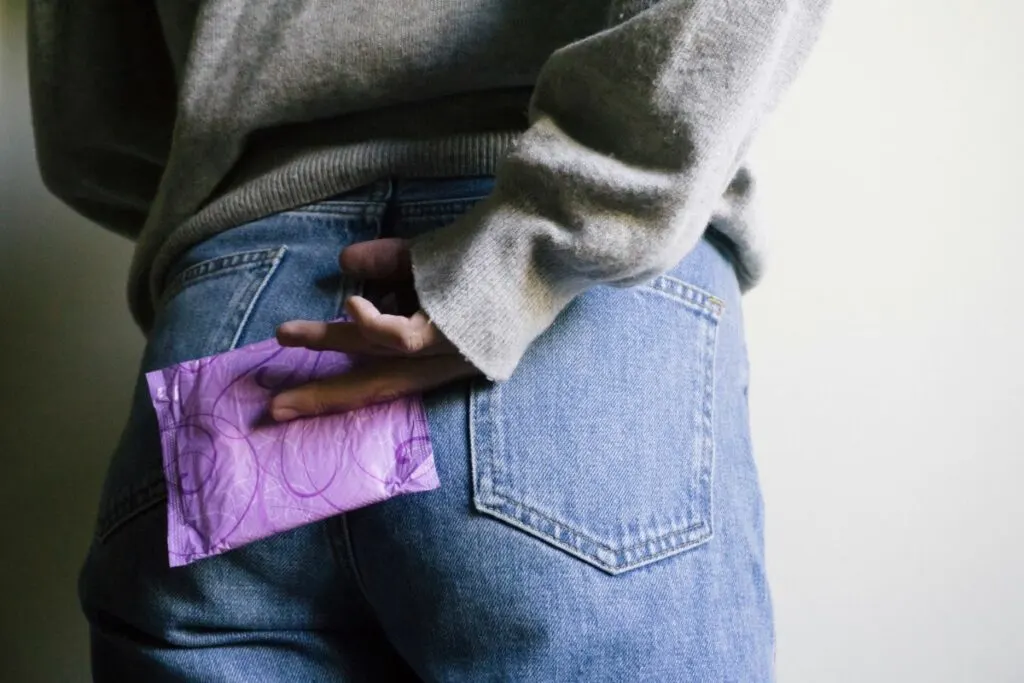School can be difficult enough without having to battle with your period on top of your studies.
Having menstrual cramps, wherever you are, is unpleasant, but having them at school – when you’re away from your creature comforts – is a complete nightmare.

In this guide, we’ll share some tried and tested tips to help stop period cramps at school.
What Causes Period Cramps?
Period cramps occur during menstruation when your uterus contracts to shed the lining.
The main culprits behind the cramping sensation are hormone-like substances called prostaglandins.
These are produced in the uterus and play a significant role in the menstrual cycle.
High levels of prostaglandins stimulate stronger uterine contractions, which can cause the uterus to press against nearby blood vessels. This can momentarily cut off the oxygen supply to the uterus, leading to pain.
The intensity of cramps can vary depending on the amount of prostaglandins produced. Those with higher levels typically experience more severe cramps.
How Painful Should A Period Be?
How painful a period is will vary from person to person.
It’s normal to experience mild or even moderate cramping in the lower back and abdomen.
The pain usually begins shortly before or at the onset of bleeding and can continue for one to three days.
You may also experience other symptoms, such as bloating, nausea, diarrhea, and fatigue.
When To Speak To A Doctor About Period Cramps
If you are regularly experiencing severe period cramps, or your menstrual cycle is interfering too much with daily activities like attending school, then it may be time to speak to a medical professional.
Tips For Easing Period Cramps At School
There are a few ways you can manage period cramps at school – let’s explore them below:
1. Be Prepared
Being prepared for your period is half of the battle.
Keep a record of when your period is due so you know exactly when you’ll need to take your essential items to school.
It can be helpful to create a period kit that you can take to school with you.
This kit can include tampons, pads, or a menstruation cup, spare underwear, a plastic bag for soiled underwear, cleansing wipes, painkillers, hot packs, and suitable snacks.

2. Stay Hydrated
You lose more fluid than normal while on your period, so it’s important to replenish this fluid and keep yourself hydrated.
Dehydration can make menstrual cramps worse. This is because the uterus is a muscle, and like all muscles, it needs proper hydration to function well.
When dehydrated, muscles can spasm more, leading to increased cramping. Drinking water helps to relax the muscles of the uterus and alleviate menstrual cramps.
For many, the menstrual cycle brings about water retention, leading to feelings of bloating.
Proper hydration can help alleviate this by encouraging the kidneys to get rid of excess salt and water.
Drinking adequate water can aid in reducing the bloated feeling that some individuals experience during their period.
3. Eat Well
Although you may not always feel like eating when you’re in pain, a healthy diet can actually help you manage your period and combat cramps.
The following foods are particularly helpful when you are on your period.
- Dark Chocolate: Dark chocolate contains plenty of magnesium, which can help to relax your muscles and ease cramping. It also helps curb sugar cravings.
- Bananas: Bananas are chock full of potassium, which is helpful in preventing water retention and bloating. They also contain magnesium to help relax your muscles. The fiber content in bananas is beneficial for digestion during your period and ensuring regular bowel movements.
- Oranges: Oranges contain vitamins C and D, as well as magnesium and potassium, making them a great fruit to snack on during your period.
- Avocados: Avocados contain fiber, magnesium, and potassium, as well as other vitamins and minerals, which can support your body during menstruation. As well as this, avocados can give you a good energy boost to combat fatigue.
- Ginger: Ginger is known to help ease nausea and bloating, and it can also help combat cramps.
- Chamomile Tea: Chamomile is full of anti-inflammatory properties that can help with pain and bloating. It can also help to keep your stress levels to a minimum.
4. Avoid Certain Foods
There are certain foods that can be counterproductive when you are menstruating – these are:
- Sugary Foods: Many people with a uterus crave sugar during their period, but unfortunately, sugar can increase blood flow and cause inflammation and bloating.
- Fast Food: Fast food often contains a lot of sodium, which can cause water retention and bloating. This type of food can also have a negative effect on digestion.
5. Products To Manage Pain
If you’re struggling with cramps, then it can be helpful to take painkillers – ibuprofen can be particularly effective in easing pain, inflammation, and discomfort.
As well as medication, you can also take a hot pack to school with you.
Hot packs, or heat wraps, are air-activated, so once you unwrap them and stick them to your underwear, they will start to warm up and provide relief.
6. Wear Comfortable Clothes
Wear comfortable and supportive underwear to school when you’re on your period (and don’t forget a spare pair of underwear).
Avoid tight clothes that are going to press on your stomach and cause more discomfort.
It can be beneficial to opt for high-waisted pants and skirts.
7. Do Some Gentle Exercise
Exercising might be the last thing you feel like doing, but gentle movement can be very helpful for easing period cramps.
Yoga, gentle stretching, and light cardio can all help to ease period pain.
8. Practice Deep Breathing
Deep breathing can be supportive in managing pain.
When you’re suffering from period cramps at school, place your hands gently on your abdomen and breathe deeply into your stomach – notice how it rises.
Hold the breath for a few seconds, and then gently breathe out again.
In Summary
Suffering from period cramps at school is unpleasant, but there are things you can do to relieve the pain.
Aim to drink plenty of water, eat foods that will support your body, and do some gentle exercise.
Remember, if your period pains are causing too much disruption at school, or you’re suffering from particularly heavy or painful periods, it’s important to tell your parents and potentially speak to your doctor.
- Homeschooling In High School: Pros And Cons - February 24, 2024
- How Do I Withdraw My Child From School To Homeschool? - February 23, 2024
- How To Not Go Crazy Homeschooling Kids: A Guide For Frazzled Parents - February 22, 2024









Leave a comment